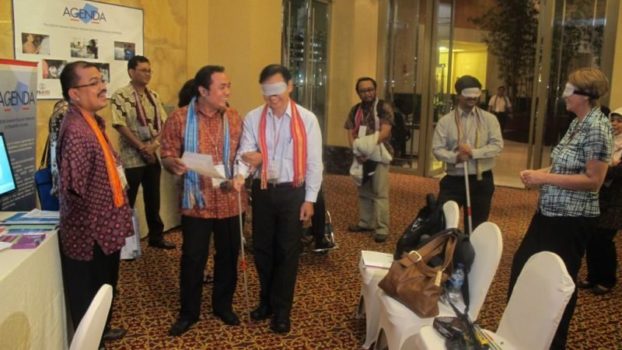By: Riri Rafiani, PPUA Penca
Two blindfolded people walked uncertainly toward a voting booth: one swinging a cane and the other assisted by an official. Another blindfolded person just sat quietly as if unsure of what to do. Once at the voting booth, the two blindfolded people had to rack their brain just to figure out how to mark their vote on the ballot paper they could not see. Later, a voter on a wheelchair was met with similar difficulties. The table in the voting booth was too tall, the ballot paper too wide, the booth too narrow, making it difficult for them to do what should have been the simple task of casting their vote in an election.
The scene was part of the simulation organized by AGENDA at the First IKAT-US Partnership Annual Conference on July 20-21, 2011 in Jakarta. Through the simulation, AGENDA let conference participants from six partner groups go through what disabled voters experience when they come to vote in an election. The simulation left a profound impression on the participants. They now know how difficult it is for people with disability to exercise their political rights. When asked about what they experienced in the simulation, the participants reported that they felt disoriented, confused, annoyed and neglected. But more importantly, they were upset by their inability to participate in an election which was supposed to be direct, public, free and confidential.
The simulation continued with instruction and demonstration on how to organize an ideal election for disabled people. This is accomplished by inserting ballot paper into an assistive device written in Braille, providing a low table with space underneath to facilitate wheelchair users, and ensuring that the top of the ballot box is no higher than 35 centimeter from the floor. AGENDA also showed guide books in Braille and emphasized the need to convert the books into video format for the hearing-impaired.
To ensure voter confidentiality, people with disability need assistance of their own choosing to help them. For this purpose, a consent form is provided for the assistant to declare their preparedness to keep the disabled person’s vote confidential or risk legal consequences. This practice keeps disabled people’s votes from potential fraud and manipulation.
The simulation concluded with a presentation on overall AGENDA program. The participants said the simulation had opened their eyes to crucial issues which had hitherto never crossed their mind.
AGENDA seeks to ensure that disabled people will be able to participate in elections without hindrance as is their right as citizens. As stated by US Under Secretary for Democracy and Global Affairs Maria Otero in her speech at the conference, participation of people with disability in an election is an important issue in the development of democracy. Meeting their needs and making elections accessible for them are the obligations of election committee. Democracy requires the participation of every person; therefore no one citizen, regardless of their circumstances, should be overlooked.

